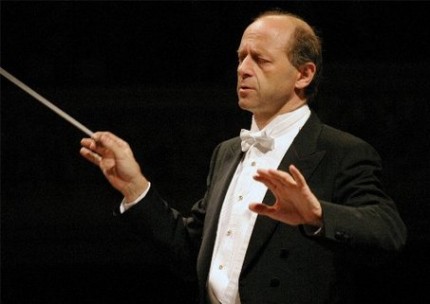Budapest Festival Orchestra makes a worthy showing in lightish program

Ivan Fischer conducted the Budapest Festival Orchestra Monday night at Symphony Center in Chicago.
Founded 28 years ago by conductor Ivan Fischer, the Budapest Festival Orchestra quickly established itself as Hungary’s finest symphonic ensemble and one of the most impressive in central Europe.
The Hungarians returned to Chicago Monday night with a generally satisfying Symphony Center stand under Fisher, who continues in his position as the ensemble’s music director. And if the orchestra’s vaunted Magyar fire and combustible dynamism were only intermittently manifest on this last stop of its American tour, blame it on some low-key and ill-conceived repertoire.
There was no real center of gravity in Monday’s program, which seemed like a missed opportunity to show off the Budapest players’ strengths. The first half consisted of a Schubert overture and lightish symphony and the second offered too-brief Bartok and Tchaikovsky’s not unfamiliar Romeo and Juliet.
The only national music was the two short excerpts from Bartok’s Hungarian Peasant Songs. Couldn’t Hungary’s finest orchestra at least offer a bad Liszt tone poem in the composer’s bicentennial year?
Hearing the orchestra a few years back in Florida I was knocked sideways by the dark, gleaming strings, brassy punch and febrile, personality-plus woodwinds. Monday night Fischer and the Hungarians sounded like a much more subdued bunch though that may have been as much to do with the Rococo first half than any personnel changes or Chicago’s less glowing acoustic.
Schubert’s Overture to The Magic Harp (aka Rosamunde) made a worthy enough calling card. Fischer took the slow introduction at a measured pace with almost Wagnerian weight, which contrasted with the sprightly main theme.
The same applied to the ensuing rendering of Schubert’s Symphony No.5. Again the playing was fluent and graceful though not always particularly individual. Winds were rather anonymous and Fischer’s moulding of phrases seemed fitfully heavy-handed though the finale had undeniable verve. It’s bad luck that this Schubert Fifth comes just two weeks after Bernard Haitink’s bracingly stylish and elegant rendering with the Chicago Symphony.
Some of the orchestra’s segmented sound comes from Fischer’s unorthodox seating plan: violins split left and right, cellos center and basses across the back with horns left and trumpets and trombones right. For the Schubert symphony, Fischer had the cellos distributed throughout the other string sections, not something one sees every day.
Whatever the mutable stage seating, the Hungarians can’t match the CSO’s tonal refinement — the Budapest band has a kind of raw, sinewy corporate sound — but concertmaster Violetta Eckhardt is a strong leader and Fischer clearly maintains a strong artistic connection with the ensemble.
The conductor’s take on Tchaikovsky’s Romeo and Juliet Overture was individual to the point of seeming almost deconstructionist — carefully calibrated and seemingly intent on shearing off the rhetorical excess. While decidedly cool, Fischer’s was a refreshingly direct and unhackneyed account of this warhorse, focusing on architecture and atmosphere rather than lyrical warmth or drama.
But it was only in the two excerpts from Bartok’s Hungarian Peasant Songs that the Budapest musicians cut loose and played with the kind of raw abandon and ferocity that distinguished the band on disc and in previous live performances. The pungent folkish winds and dark luster of the strings in the “Ballad: Theme and Variations” and “Hungarian Peasant Dances” made the ensemble seem like a massive cimbalom. Too bad we didn’t hear more of these colorful Bartok orchestrations of his piano originals.
So too, with the encores. Following a refined reading of the lyrical theme from Schubert’s Rosamunde, Fischer and his compatriots responded to the audience’s Euro-style rhythmic clapping with a whirlwind account of Bartok’s Rumanian Folk Dance, in which the musicians seemed happiest and in their own element.